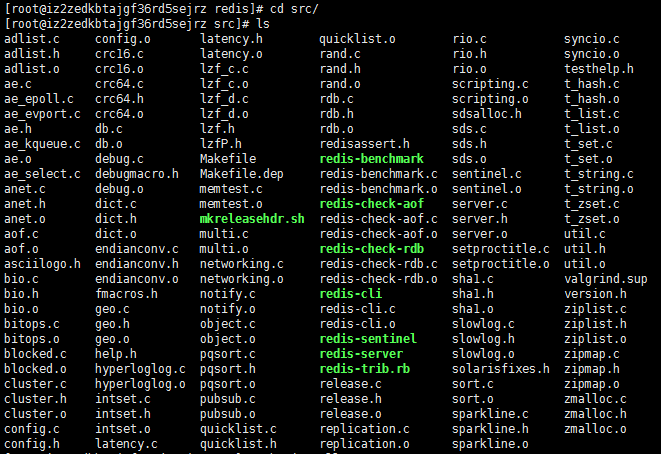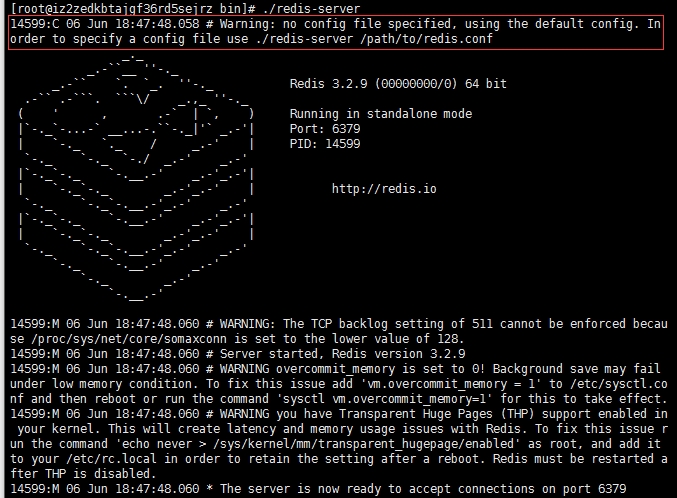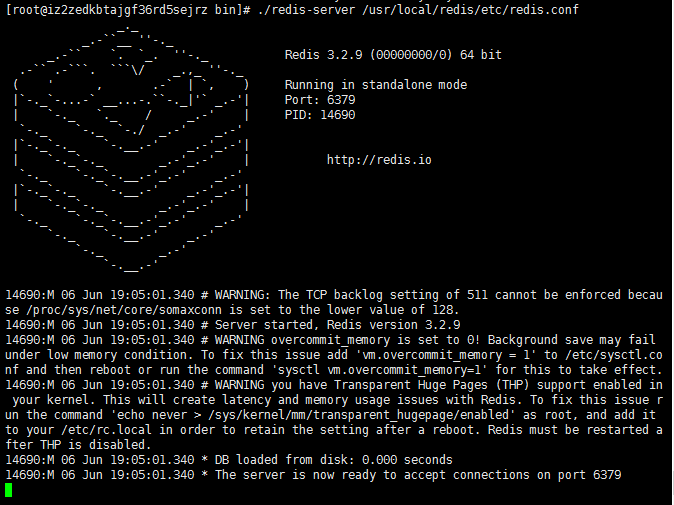June 6, 2017 Redis's latest stable version is 3.2.9
1. Dependencies required to install and compile
Update the software to the latest version
yum update && yum upgrade
Install compile dependencies
yum install gcc make tcl
2. Download and unzip redis
cd /usr/local wget http://download.redis.io/releases/redis-3.2.9.tar.gz tar zxvf redis-3.2.9.tar.gz mv redis-3.2.9 redis
3. Compile and install redis
cd redis make make test
At this time, the running programs (green files) will appear in our src directory.

4. Move files to corresponding directories
We create bin (running files) directory and etc (configuration files) directory under / usr/local/redis directory
mkdir -p /usr/local/redis/etc mkdir -p /usr/local/redis/bin
Assign seven green files in the / usr/local/redis/src directory to the / usr/local/redis/bin directory
Assign the / usr/local/redis/redis.conf file to the / usr/local/redis/etc directory
5. Start Redis Service
cd /usr/local/redis/bin ./redis-server

However, in doing so, we did not use the following configuration file for etc to start (the red line section in the figure).
If you want to start through the specified configuration file, you need to specify the configuration file at startup.
Here we first terminate the service with ctrl+C, then check whether redis service terminates cleanly, and then start the service by setting configuration files.
ps -aux | grep redis lyt 14631 0.0 0.0 112648 960 pts/1 R+ 18:48 0:00 grep --color=auto redis
Now let's run redis with the configuration file / usr/local/etc/redis.conf
./redis-server /usr/local/redis/etc/redis.conf

We found that redis was started by reading our configuration file.
However, redis is still running in the foreground.
If you need to run in the background, change the daemonize configuration item to yes
vim /usr/local/redis/etc/redis.conf
Search:' daemonize'
Change the daemonize configuration item to yes to save and exit
Then we use the configuration file to start redis-server again.
As you can see, redis is started in the background, and you can see that redis is running through the ps command.
6. Client login
/usr/local/redis/bin/redis-cli 127.0.0.1:6379> ping PONG 127.0.0.1:6379>
Enter ping and return PONG to indicate that the client logged in successfully.
7. Close Redis Service
Stop the Redis instance
We can use it.
pkill redis-server
8.redis.conf related configuration
daemonize #If you need to run in the background, change this item to yes pidfile #The address for configuring multiple PIDs defaults to / var/run/redis.pid bind #Bind ip and only accept requests from that ip after setting port #Listener port, default 6379 loglevel #There are four levels: debug verbose notice warning logfile #Used to configure log file address databases #Set the number of databases. The default database is 0. save #Set the frequency of redis for database mirroring. rdbcompression #Whether to compress during mirror backup dbfilename #File Name of Mirror Backup File Dir #File Placement Path for Database Mirror Backup Slaveof #Setting up a database as a slave database for other databases Masterauth #Password Validation Required for Main Database Connection Requriepass #Password is required for login settings Maxclients #Limit the number of simultaneous users Maxmemory #Set the maximum memory redis can use Appendonly #Open append only mode Appendfsync #Set the frequency of appendonly.aof file synchronization (the second way to backup data) vm-enabled #Whether or not virtual memory support is enabled (all parameters at the beginning of the vm are configured for virtual memory) vm-swap-file #Setting Exchange File Path for Virtual Memory vm-max-memory #Set the maximum physical memory size used by redis vm-page-size #Setting the page size of virtual memory vm-pages #Set the total number of page s to exchange files vm-max-threads #Set the number of threads that VM IO uses at the same time Glueoutputbuf #Store small output caches together hash-max-zipmap-entries #Setting the critical value of hash Activerehashing #Rehash